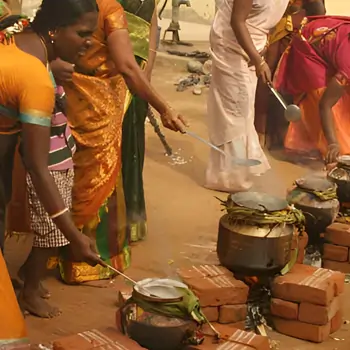Makara Sankranti Festival in Telangana
The sun is crucial for life on Earth. Without its light, heat, and energy, life would be impossible, plunging the planet into an icy darkness. Makara Sankranti stands out as one of the few festivals aligned with the solar cycle, while most others are celebrated according to the lunar cycle. The epic Mahabharata, dating back approximately 2000 years, mentions this festival dedicated to the sun god. It is celebrated annually on January 14th. On this auspicious day, people bath in sacred rivers and worship the sun, a divine force of nature, to pay tribute and usher in the next six months of warmer weather. Makara Sankranti is observed over four days, each filled with distinct rituals. Families gather, spending time together amidst a variety of games and fun, including the flying of colourful kites, a joyous activity enjoyed by all ages and genders. Although once common, the tradition of cockfighting was eventually prohibited by the government. The festival is celebrated exuberantly under different names globally; in Pakistan as "Tirmoori," and in Nepal as "Magha Sankranti," highlighting its universal appeal across different religions, castes, and regions.

The first day, known as Boghi, is particularly captivating. People light bonfires with wood and discard unwanted household items, symbolically ridding themselves of past burdens and embracing renewal. This purging ritual is termed "Rudra Gita Gyana Yagna," signifying the expulsion of malevolence and the welcoming of new beginnings. Women and children take morning showers with jujube flowers believed to ward off evil.
The actual festival day, Makara Sankranti, begins with preparations before dawn. Residents decorate their homes' exteriors with Rangoli using rice flour. These artworks are enhanced with colours, flowers, and cow dung, showcasing individual creativity. Dressed in new attire, families convene to enjoy traditional delicacies, served on banana leaves to signify cultural hospitality.
Kanuma, the third day, acknowledges farmers, our unsung heroes who nourish us. It is a time to express gratitude towards both the celestial and earthly providers of our sustenance—the sun and the farmers. Special ceremonies honour livestock, which are revered as divine.
The festivities continue unabated into Mukkanuma, the final day. Farmers pay homage to natural elements essential for agriculture. Unlike the preceding days, non-vegetarian food is consumed, offered after prayers to village deities with animal sacrifices. The day culminates with communal gatherings of family and friends, embracing new beginnings. A unique aspect is the presence of Haridas, who, adorned with a decorated cow, wanders the streets singing devotional songs to Lord Vishnu, communicating solely through his melodies in this lively celebration.
